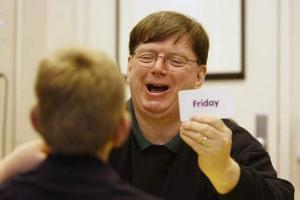Gene Brugger, Teacher a St. Rita School for the Deaf
In his second-floor classroom at St. Rita School for the Deaf, teacher Gene Brugger spends 45 minutes on a morning exercise that would take most teachers five minutes.
Over and over he sounds out the beginning sound – “th-th” – for Thursday, holds up flash cards for students to match the word to the sound, and demonstrates its American Sign Language motion.
He repeats the actions for the name of the month, the day’s weather and finally his students’ names. And he does it day after day after day.
At a horseshoe-shaped table around him, four boys ages 7 to 10 alternately furrow their brows, grin or gasp in excitement or frustration at what their teacher is asking them to do. Not a single answer or motion comes easily.
The four make up Brugger’s entire class. The disorder they struggle with makes basic communication, let alone academic learning, a painstaking endeavor.
They have varying degrees of autism and apraxia, a poorly understood neurological disorder that affects their speech, language processing and motor skills.
While other teachers can focus on imparting information, Brugger must first help his students find a way to communicate. They are simultaneously learning sign language, spoken language and written language along with subjects like reading and math.
It takes intense concentration, patience and orchestration. And Brugger – a 56-year-old former Marine with 25 years in the banking industry who is a first-year teacher – is by all accounts already a master at coordinating it all.
“He has four kids with multiple challenges, and some are not the same challenges. He can’t just go to a book and go to page 42 for what to do,” says his principal, Greg Ernst. “When Gene is putting together a lesson plan, he probably should put a question mark after each of the concepts – ‘This really might not happen today.'”
Brugger calls it “building the class from the ground up.” His time outside the classroom is spent searching online for new methods and approaches.
He constantly consults Ernst and his colleagues for better ways to get across a lesson. And he sends a daily report home to parents, letting them know how their children’s day went, what they mastered and what they struggled with.
Little about his students escapes Brugger’s notice. He knows who was fidgety on the school bus that morning, who can sign the best letter ‘O’, whose favorite color is orange and who feigns having to go to the bathroom to get out of uncomfortable work.
Watching his own child suffer with a wrongly diagnosed learning problem led Brugger to education, and to St. Rita.
“I probably work harder here on a daily basis than when I worked for Fortune 500 companies. You’re making dozens of decisions every hour,” says Brugger, who makes a fourth of the salary he did in business. “With people my age who have had a business career, the difference is that we choose this. We understand the demands.
“I always thought I wanted to teach history, but after a single observation in a special education classroom, I knew this is what I wanted to do,” he says. “I’m old enough not to ignore it when life tells you, ‘Take this path.'”

